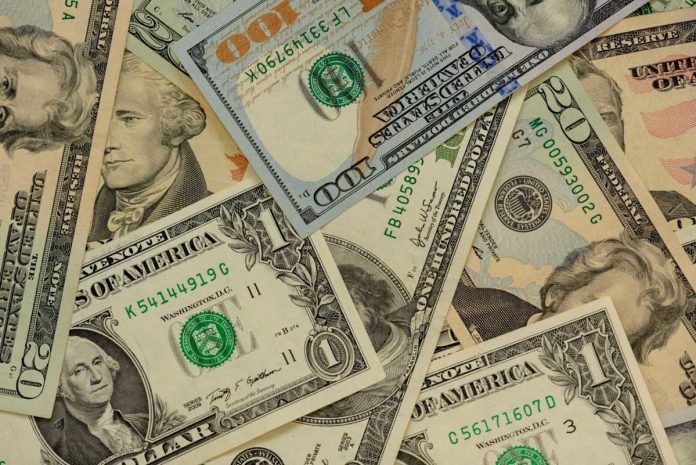The dollar index (DXY00) today is up by +0.19%. The dollar is moving higher today on mixed US economic reports. The upward revision to Q2 nonfarm productivity and the downward revision to Q2 unit labor costs are supportive for the dollar. The dollar also found support after the Aug ISM services index expanded at its fastest pace in six months.
However, the smaller-than-expected increase in the Aug ADP employment change and rise in weekly jobless claims to a 10-week high were dovish for Fed policy and bearish for the dollar. The dollar is awaiting Friday’s monthly US payroll report for direction.
The Aug ADP employment change rose +54,000, weaker than expectations of +68,000
US weekly initial unemployment claims rose by +8,000 to a 10-week high of 237,000, showing a weaker labor market than expectations of 230,000.
US Q2 nonfarm productivity was revised upward to 3.3% from the previously reported 2.4%, better than expectations of 2.7%. Q2 unit labor costs were revised downward to +1.0% from the previously reported +1.6%, a smaller increase than expectations of +1.2%.
The US Aug ISM services index rose +1.9 to 52.0, stronger than expectations of 51.1 and the strongest pace of expansion in six months.
Federal funds futures prices are discounting the chances for a -25 bp rate cut at 95% at the September 16-17 FOMC meeting and at 56% for a second -25 bp rate cut at the following meeting on October 28-29.
EUR/USD (^EURUSD) today is down by -0.12%. The euro is under pressure today from a stronger dollar. Also, today’s weaker-than-expected report on Eurozone July retail sales is bearish for the euro.
Eurozone July retail sales fell -0.5% m/m, weaker than expectations of -0.3% m/m and the biggest decline in 13 months.
On the geopolitical front, diplomatic efforts to end the war in Ukraine remain elusive, which is bearish for the euro. Last Friday, German Chancellor Merz and French President Macron called for secondary sanctions on Russia for its war in Ukraine and said they will push for measures targeting “companies from third countries that support Russia’s war.” Last Thursday, German Chancellor Merz stated that a meeting between Russian President Putin and Ukrainian President Zelensky is unlikely to take place. The outcome of the Russian-Ukrainian war could have macroeconomic implications regarding tariffs and oil prices, and could, of course, have significant consequences for European security.
Swaps are pricing in a 1% chance of a -25 bp rate cut by the ECB at the September 11 policy meeting.
USD/JPY (^USDJPY) today is up by +0.22%. The yen is moving lower today on dollar strength and negative carryover from Tuesday’s news that the Secretary General of Japan’s Liberal Democratic Party, Hiroshi Moriyama, a key ally of Prime Minister Ishiba and a proponent of fiscal discipline, is stepping down, which is seen as paving the way toward a more expansionary fiscal policy. Lower T-note yields today are limiting losses in the yen.
December gold (GCZ25) today is down -34.60 (-0.95%), and December silver (SIZ25) is down -0.770 (-1.83%). Precious metal prices are sliding today as a stronger dollar sparked long liquidation and is weighing on prices. Strength in stocks today has also curbed safe-haven demand for precious metals. Today’s economic reports showing weakness in the US labor market are negative for industrial metals demand and silver prices.
On Wednesday, gold prices reached a new all-time high, and silver prices hit a 14-year high, as recent economic news boosted the chances for the Fed to cut interest rates. Today’s weaker-than-expected US labor market news pushed the chances for a Fed rate cut at the September 16-17 FOMC meeting to 95%, a bullish factor for precious metals prices. Demand for gold as a store of value also boosted gold prices due to threats of spiraling budget deficits and sticky inflation. In addition, President Trump’s move to fire Fed Governor Lisa Cook has sparked concerns about the Fed’s independence and increased demand for safe-haven assets, including precious metals. Finally, political uncertainty in France is driving demand for gold as a safe-haven, following French Prime Minister Bayrou’s call for a confidence vote that could bring down his government as soon as next week.
Gold has continued safe-haven support related to US tariffs and geopolitical risks, including the conflicts in Ukraine and the Middle East. The fund buying of precious metals continues to support prices, following the rise in gold holdings in ETFs to a 2-year high on Tuesday and the rise in silver holdings in ETFs to a 3-year high on Wednesday.
On the date of publication, Rich Asplund did not have (either directly or indirectly) positions in any of the securities mentioned in this article. All information and data in this article is solely for informational purposes. This article was originally published on Barchart.com

